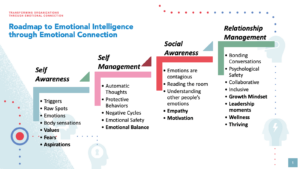Emotional intelligence has been touted as a “soft skill” in the past. Its importance to developing successful teams and even entire workplace cultures over recent years has become quite evident. And is has become clear that it is not such a soft skill after all.
Some may think of themselves as incapable of adopting emotional intelligence into their leadership practices. It is, thankfully, a skill that can be improved upon. That holds true even if it doesn’t seem to come naturally.
Daniel Goleman, Ph.D., authored the bestselling book Emotional Intelligence in 1995 and is considered a leading expert on the subject. He recently met with IIRP President John W. Bailie, Ph.D., to discuss why emotional intelligence is especially important in today’s times, why it should matter to all of us, and how everyone can improve.
COVID has transformed many of our workplaces into remote work without the benefits of in-person collaboration. It has also created an environment of fear and uncertainty for many people. Leaders have been placed in a difficult situation: How can you effectively lead and manage others if you aren’t meeting in person?
People give subtle emotional cues during a conversation that we can instinctively recognize. Yet on camera, it can be more difficult to identify them. This is one specific area where leaders can benefit from emotional intelligence. You can improve upon digital meetings by working on your own skills, such as managing your emotions and making an effort to communicate clearly. Empathy and self-awareness are key to helping you relate with your team. As Daniel Goleman explains it, you need to focus on “how is the person receiving what I am saying?”
There are four specific pillars of emotional intelligence:
The first step to emotional intelligence is self awareness. When someone is self aware, they have a good understanding of their own emotions and physical sensations. They can recognize their own triggers or raw spots, and have a developed understanding of their values, fears and aspirations.
Becoming more aware of your own thoughts and feelings is the first step to understanding others. Then you’ll learn to control your own uncertainty or anxiety through self management. This is where resilience comes in. Master the ability to return to a calm and clear state of mind, break negative cycles, and find emotional balance. Empathy plays a big part for understanding the needs, fears, and feelings of the people you meet. It can help you understand where others are coming from, and how to bring everyone together to address the shared mission.
After self awareness and self management stages comes the social awareness stage. At this point it becomes easier to understand other people’s emotions, develops deeper empathy and motivation, and enables a leader’s ability to “read the room.” That’s true even for remote meetings.
The final stage is relationship management. Bonding conversations and growth mindset occur at this point in emotional intelligence development, as do leadership moments. It is the collaborative, inclusive, and psychological safety zone of emotional intelligence.
You may wonder how you can improve upon your emotional intelligence skills. It can seem a daunting prospect but is actually easier than you think. Support from leadership coaches and experts can make it a seamless process that focuses on your strengths and where improvements can be made.
Understand why it matters. Daniel Goleman explains that leaders should understand why emotional intelligence matters. Its impact has a direct, positive outcome for your team:
Emotional intelligence can be woven throughout the organization, including hiring practices, performance management, training, and even for spotting high potential. The goal for any successful organization is to attract and retain quality candidates. Emotional intelligence throughout a corporate culture can achieve just that.
Goleman asks, “What is the emotional salary you are paying?” Highly skilled people can go wherever they want. The more emotionally intelligent a boss is, the more people will like them, and be loyal. They will value the organization and what they do. If you value the long-term sustainability of your organization, then adopting emotional intelligence is a critical aspect of its success.
Make an effort to learn. Emotional intelligence is a skill that can be learned and improved upon. Utilize specific tools, such as Emotional Connection: The EmC Strategy book, or hire an executive coach who will work with you to identify existing strengths while addressing areas for improvement.
A coach can help guide you with a personalized plan for emotional connection leadership, as well as work with your teams to improve their emotional connection communication and collaboration skills.
All organizations want their employees to bring their whole selves to work. To feel loyal and do their best. Companies who are most successful weave emotional intelligence throughout leadership and their entire culture to create an environment that is supportive with open communication and trust. It’s not too late to start expanding your skills or adopting them into your daily work. Your employees will thank you.

Looking for more on this subject? Read “How Can We Give Our Leadership an H2H Boost?”
Learn more about EmC Leaders solutions to help you cultivate emotional connection and build thriving teams who succeed together. And request a free consultation to learn how to instill an emotional connection into your organizational culture.